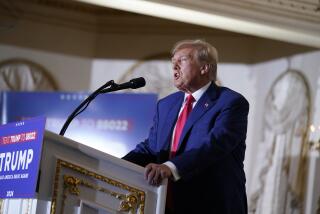Op-Ed: How a lone Republican changed Trump’s position on pot
Is there a character more derided in modern American politics than the anti-Trump Republican?
Consider soon-to-retire Sen. Jeff Flake (R-Ariz.), a possible primary challenger to Donald Trump in 2020 and author of a bestseller attacking the president’s America-first ideology. When Flake responded to the administration’s brutish comments about Canadian Prime Minister Justin Trudeau by tweeting “Fellow Republicans, this is not who we are,” the condemnation was swift and brutal — from the left.
“This is exactly who you are,” the Splinter’s Emma Roller snapped back. “Flake’s criticism of Trump’s G-7 antics is a sham,” hissed Think Progress. Hand-wringing GOP senators such as Flake, John McCain and Susan Collins, charged the activists at Blue Virginia, are just a bunch of melodramatic Democracy Peacocks — all plume, no teeth.
Enter the Fray: First takes on the news of the minute from L.A. Times Opinion »
The best version of these critiques is that Flake and his cohort should, you know, do something. So it’s interesting to examine the successful tactics of a Republican senator who did just that — Colorado’s first-term Sen. Cory Gardner.
Gardner, 43, is a former House GOP “Young Gun” known for being more problem-solver than bomb-thrower. He displayed both talents, however, in managing to convince a law-and-order president who appointed a drug-warrior attorney general to come out in favor of leaving legal marijuana alone.
While nothing in Trumpworld is guaranteed until the ink is dry, this could be a huge turning point against the long-ruinous drug war.
In a wide-ranging back-and-forth with reporters at the end of last week, President Trump was asked whether he supported a bipartisan bill introduced by Gardner and Sen. Elizabeth Warren (D-Mass.) — the Strengthening the Tenth Amendment Through Entrusting States (STATES) Act — which would make the federal Controlled Substances Act inapplicable in states where pot-related activity has been legalized.
“I really do,” Trump said. “I support Sen. Gardner. I know exactly what he’s doing. We’re looking at it, but we’ll probably end up supporting that, yes.”
While nothing in Trumpworld is guaranteed until the ink is dry, this could be a huge turning point against the long-ruinous drug war. How did Gardner work this magic? By doing something Republicans excelled at when Barack Obama was president but which they have largely ignored since: Using every bit of leverage they command to frustrate a power-wielding president.
Gardner went berserk in January when Atty. Gen. Jeff Sessions announced in January that he was rescinding the Justice Department’s 2013 memo guiding U.S. attorneys to de-prioritize federal enforcement against state-legal marijuana operations. Colorado had voted to legalize recreational marijuana in November 2012, and had begun legal sales in January 2014. Gardner wasn’t in favor of legalization in 2012, but in 2018 he was ready to defend his state’s law.
“I believe that what happened today is a trampling of Colorado’s rights,” he said in a podium-thumping speech after Sessions’ decision was made public. Prior to the attorney general’s confirmation, Gardner charged, he had promised that the 2013 memo would not be rescinded and that pot enforcement would not be an administration priority.
“Until he lives up to that commitment,” Gardner said, “I will be holding all nominations to the Department of Justice.”
Senate Majority Leader Mitch McConnell (R-Ky.) likes to say that the world’s greatest deliberative body is largely in the “personnel business,” moving briskly through the confirmation of judges, Cabinet members and lower-level executive branch appointments. Gardner gummed up that machinery for three months by using his parliamentary ability to place a hold on a nomination, a barrier that can only be overcome through a time-sapping cloture vote.
It took about 20 holds for Trump to crack. In April, Gardner issued a news release saying he had obtained a verbal commitment from the president to support legislation protecting states that legalized marijuana from federal drug law enforcement, despite his attorney general’s proclivities. The president’s comment last week was an indication that the promise will have more staying power than, say, Trump’s “firm commitment” to Flake to work together on a solution to the Deferred Action on Childhood Arrivals program in exchange for Flake’s yes-vote on last year’s tax cut.
So is Gardner’s form of hostage-taking scalable? It’s certainly worth a try among Trump-averse Republicans in the Senate, given that chamber’s slim 51-47-2 GOP majority (with the two independents caucusing with Democrats). But there are some unique aspects to the presidential buy-in on pot legalization.
First, Trump favored state decision-making about marijuana when he was on the campaign trail. Second, keeping the feds out of the enforcement business in pot-legal states is widely popular — 70% in an April Quinnipiac poll. (Straight-up legalization is now polling at 63%, a percentage no president has ever achieved in the popular vote.) And finally, let’s not forget that Trump isn’t exactly shy about tweaking Jeff Sessions.
Favorable conditions aside, Gardner clearly forced the issue. The Senate is designed to be obstructionist, to thwart the ambitions of presidents and House members who want to get things done fast. For those senators who consider the president a challenge to the fundamental ideas of conservatism, Gardner’s example is instructive. Instead of merely standing athwart C-SPAN’s view of history yelling “stop,” they should use the power the Constitution and the Senate’s rule book gives them and stick out a foot when the president walks by.
Matt Welch is editor at large at Reason magazine, and a contributing writer to Opinion.
Follow the Opinion section on Twitter @latimesopinionand Facebook
More to Read
A cure for the common opinion
Get thought-provoking perspectives with our weekly newsletter.
You may occasionally receive promotional content from the Los Angeles Times.










